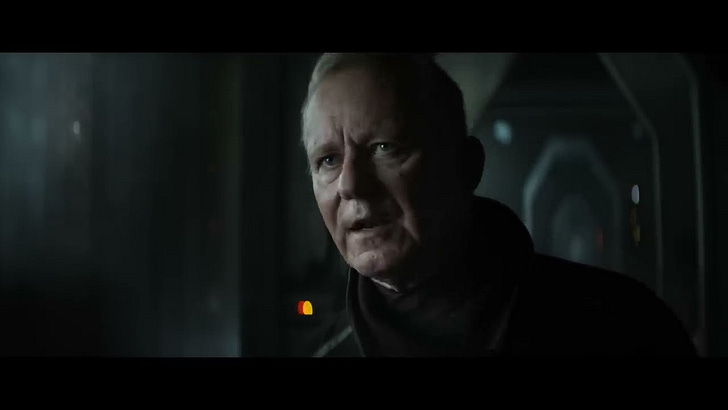Supervisor Lonni Jung: My sacrifice? It means nothing to you, does it?
Luthen Rael: I said I think of you constantly and I do. Your investment in the Rebellion is epic. A double life? Every day a performance? The stress of that? We need heroes, Lonni, and here you are.
Supervisor Lonni Jung: And what do you sacrifice?
Luthen Rael: Calm. Kindness. Kinship. Love. I've given up all chance at inner peace. I've made my mind a sunless space. I share my dreams with ghosts. I wake up every day to an equation I wrote 15 years ago from which there's only one conclusion, I'm damned for what I do. My anger, my ego, my unwillingness to yield, my eagerness to fight, they've set me on a path from which there is no escape. I yearned to be a savior against injustice without contemplating the cost, and by the time I looked down, there was no longer any ground beneath my feet. What is my sacrifice? I'm condemned to use the tools of my enemy to defeat them. I burn my decency for someone else's future. I burn my life to make a sunrise that I know I'll never see. And the ego that started this fight will never have a mirror or an audience or the light of gratitude. So what do I sacrifice? Everything!
Andor is one of the best series Disney has made in years. There are so many complex characters. Each character impacted one of Disney's greatest achievements, “Star Wars: A New Hope.” Andor, along with Rogue One, tells the story before the Death Star. It's how the plans to destroy the Death Star arrived in Princess Leia's hands.
Before this, Star Wars was black and white. Good vs. evil. Luke vs. Darth Vader. In Andor, Disney introduced a type of antihero in Luthen Rael. A man who created the rebellion out of nothing. He used senators and thieves to achieve one goal, freedom for the Galaxy. In the above scene, Luthen is meeting with one of his imperial spies, Lonni. Lonni’s daughter had just been born, and he wanted out of the rebellion. He doesn't want to risk her livelihood. It was one thing to risk his own life, but now, as a father, he had to think of his daughter. Luthen responds that he cannot let Lonni go. He argued that the rebellion needed all the heroes it could get, and Lonni was a hero. As he applauds Lonni's sacrifice, Lonni feels his sacrifice means little to Luthen. Lonni asks Luthen what he has had to sacrifice.
Luthen, by his own admission to Lonni, is willing to sacrifice the key essentials of human decency. Kinship, love, and kindness are all thrown out for the goal of the rebellion. Luthen was even willing to use the tools of his enemies. He was willing to play the game of the very people he hated. Luthen viewed the people of the rebellion as less important (at moments) than the rebellion itself. He was willing to dispose of those pawns to take back the kingdom.
The scary thing is as a viewer, you begin to feel that Luthen is justified. Luthen was willing to not receive credit, which he wouldn't. Luthen was willing to die before the sunrise he was working for would come. One day his “adopted daughter” would see that sunrise.
The dangers of Luthen are in all of us. We tend to view our cause and our viewpoints as the most important thing in the universe. We are willing to sacrifice calm, kindness, love, kinship, and much more to win people over to our side. Our side may be a new health trend, a cause for social justice, or a theological point. If we are willing to sacrifice others, we may have built an altar to a false god. The Luthen in all of us longs to be right and is willing to become the villain in others’ minds to show them the light. We are willing to set aflame our human decency and our very lives for others to see our point. Yet, this is not what Jesus meant when He called His followers the light of the world.
When we allow our ego to win out over the fruit of the spirit we lose the battle and war. Luthen allowed his pride to fuel his decisions rather than his love. He claimed to sacrifice everything, but his ego was not something he would ever let go of. He would never lose. Will you?
As Christians, we must be willing to admit we are wrong or could be wrong. We must be willing to lay down our weapons for love, unity, and, most importantly, Christ. The beauty is that we have a better hero. One who never would use the tools of his enemies to win. But instead, he took on the penalty for His enemies’ sins. He literally sacrificed everything so that we may live. And we must follow His example with our love towards one another (Philippians 2:1-5).






At first, I read the title as “The Lutheran In All of Us” 😆 — but this was better.
Jesus never violated principle for victory—in fact, His victory was only possible because He never violated principle. In a messy world, the temptation to “do evil that good may come” is strong and may sometimes seem to our human perspective the only reasonable choice. This is where Proverbs 3:5 reminds us, “Trust in the LORD with all your heart, and do not lean on your own understanding.” We must imitate Christ.
Of course, the caveat to this is that you have to have the right principles to begin with, and that is sometimes more nuanced than either side (the principled or the pragmatists) care to acknowledge. Discerning and applying the right principles is also a function of imitating Christ.